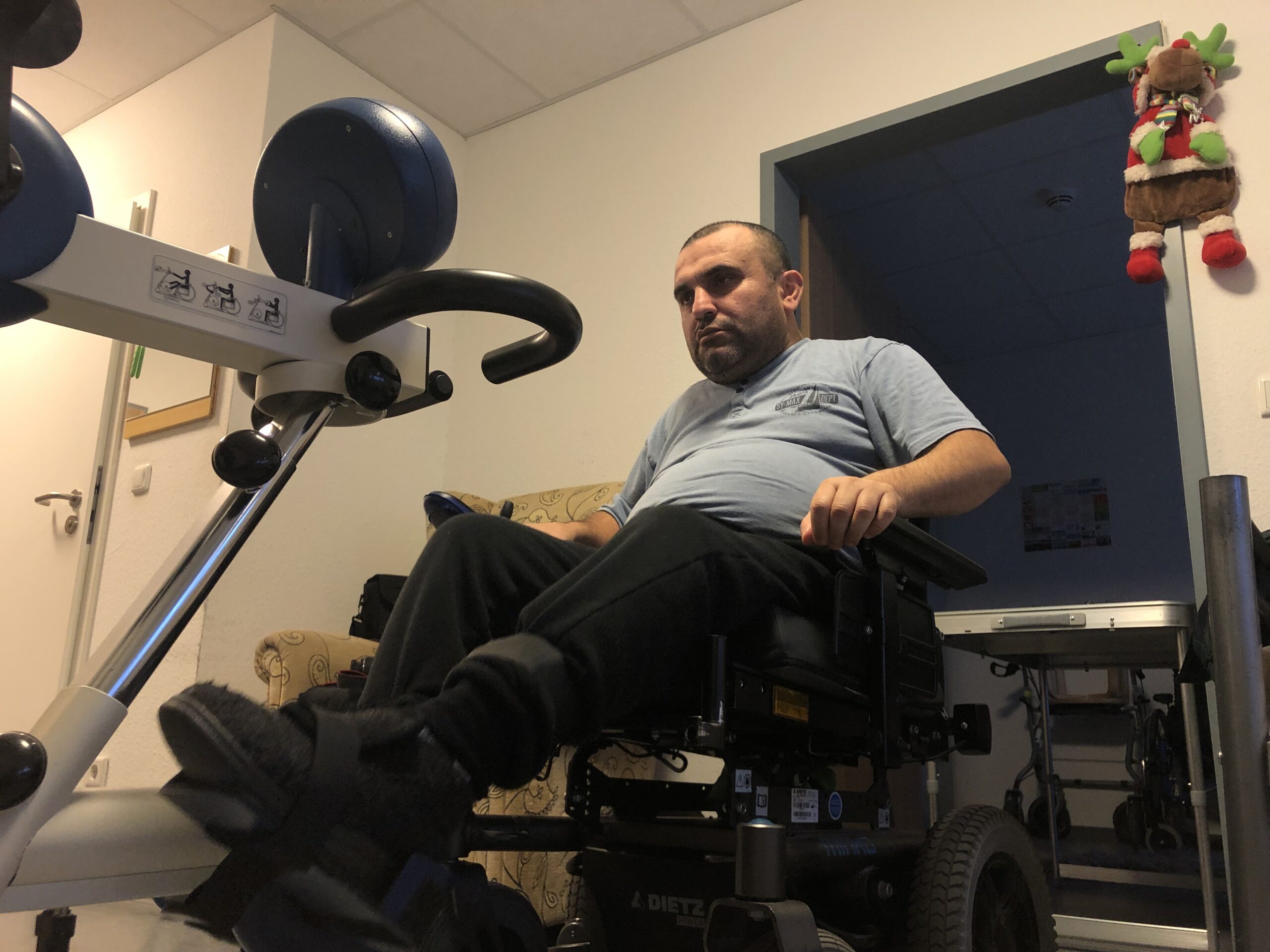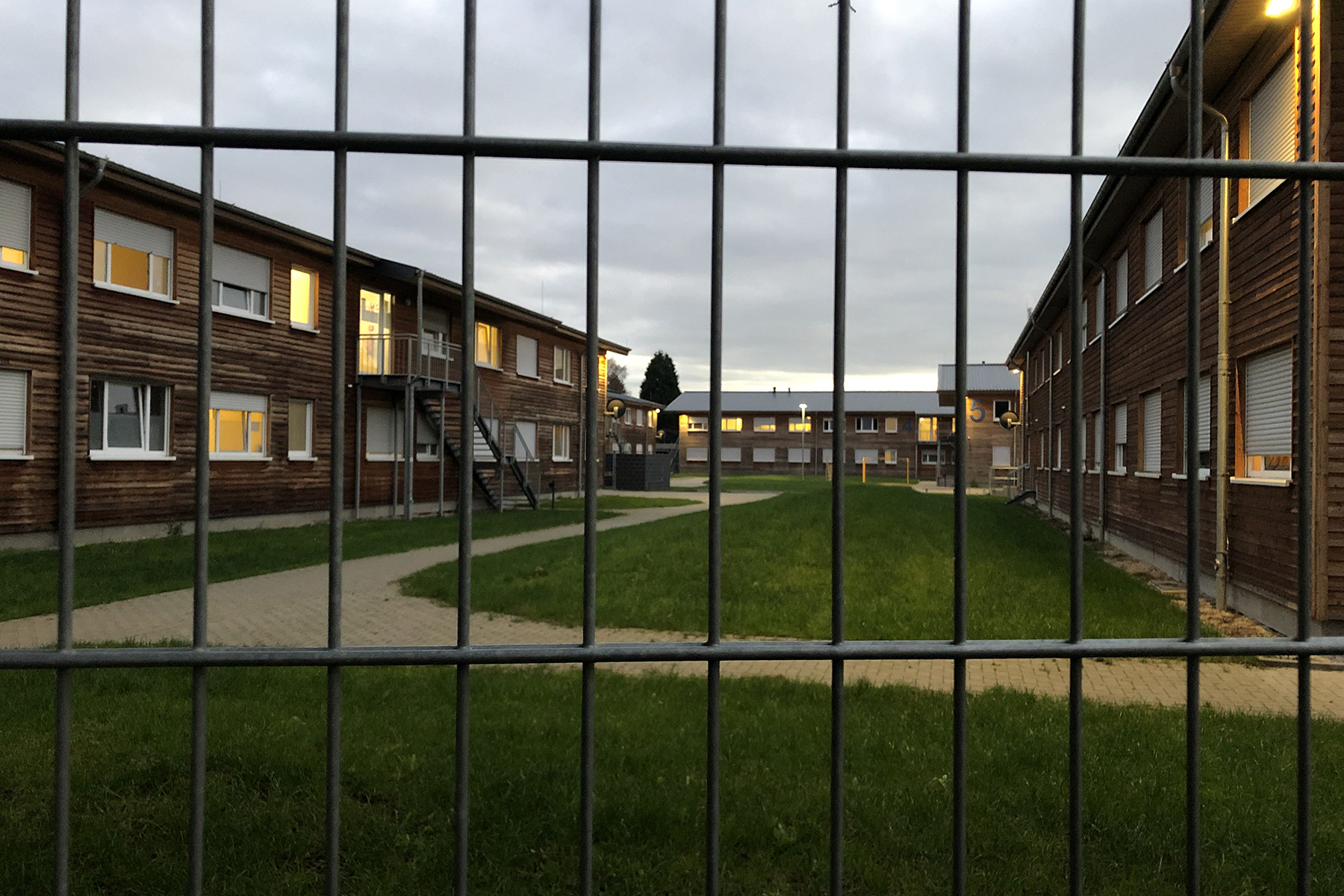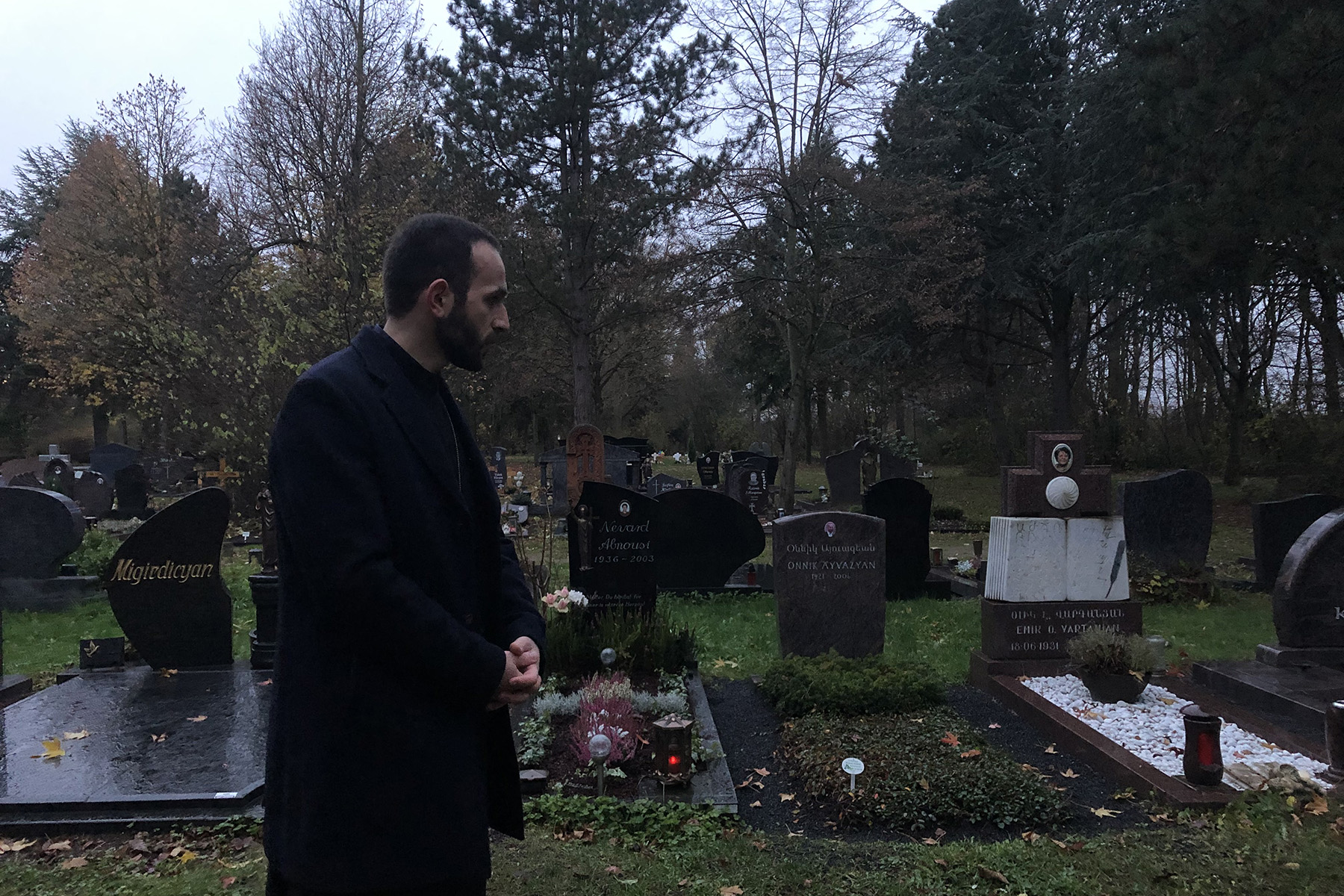
Many Armenian citizens with debilitating and life-threatening health problems that they cannot afford to treat in their homeland look to Germany as their last chance for treatment and recovery — despite the high chance of deportation.
The small public square in front of Dusseldorf’s main train station evokes feelings of nostalgia for the 42-year-old Armenian woman standing in front of it. Inga can’t help but compare everything she sees with her hometown of Gyumri, a city in the north of Armenia.
Her husband, 47-year-old Torgom Sargsyan, joins us a few minutes later, rolling up in a wheelchair. Torgom used to work as a driver until the day he realised he barely had control of his legs, and from then his condition only grew worse.
It was the hope of treating this condition that brought the couple to Germany, they could never afford to treat in Armenia. Inga moved four years ago, and Togrom five years ago — four of those he has had no choice but to use a wheelchair.
‘If the authorities come to your door and order you to pack your things, then that’s it, your train arrives. Until then you are a “passenger” here,” Torgom tells me. He applied for refugee status in 2017, but has since remained in legal limbo — he has to renew his asylum claim every six months.
Since then, hundreds of Armenians like him have already been deported.
Over 13,400 citizens of Armenia requested asylum in Germany between 2015 and 2020. Alongside France, it is among the top destinations for low-income Armenians seeking medical treatment. Some even sell their homes in Armenia in order to fund their trip.
‘I know they won’t’
Hidden behind a tall fence and surrounded by imposing concrete buildings, only a few tram stops away from downtown Dusseldorf, a series of small — ostensibly temporary — wooden buildings are what Torgom, his wife, and hundreds of other asylum-seekers call home. The other residents are mostly from the Middle East and the poorer countries of the former USSR.

We are sitting in Torgom’s well-furnished flat and can hear the neighbour’s music, a Central Asian tune, through the paper-thin walls. In front of a plain grey wall decorated with religious icons sits the equipment he uses as a part of his rehabilitation.
‘Germany is a humanitarian country, it takes care of me, my country won’t give me anything’, he tells me. ‘I am longing to return home, but if I am back it will be the end of me.’
‘I cannot be a burden to my family’, he adds solemnly.
Torgom has a degenerative disease of the brain and spinal cord. His condition has not improved in five years, but thanks to the efforts of German doctors, neither has it gotten worse.
He and Inga have paid a heavy price for the treatment. Their 16-year old daughter still remains in Armenia, as do all of their other relatives.
When he talks about them Togrom can barely contain his emotion.
‘My mother got Covid recently -’, his voice breaks, and he struggles to finish the sentence as tears wet his cheeks. ‘I couldn’t sleep.’
He takes a moment to compose himself, before continuing.
‘Everyone is there, together, and I am on foreign soil, where you never know what awaits you.’
Despite these painful and regular bouts of home-sickness, Torgom has no illusions about returning home.
‘If I knew that Armenia would care 20% of how Germany cares for me, I would return tomorrow’, he said. ‘But I know they won’t.’
The German dream
A rare guest at the dormitory, Manan, who dropped by during my visit with the Sargsyan family, has a similar story.
The Armenian woman came to Germany with little more than a Czech tourist visa, and one word in her German vocabulary: ‘Asyl’ (asylum).

‘I had never even travelled alone to Yerevan. I spent my whole life in my town, and when one day they told me that I needed to go to Germany, I panicked and I cried. It was difficult,” she recalls.
Manan does not want the name of her hometown, a medium-sized settlement near Yerevan, or her last name published, fearing what her neighbours might think. Most of her neighbours do not know the real reason she is in Europe.
‘The medication is very expensive and I could not afford it in Armenia’, she says. ‘Where could I work to earn €5,000 per month so I could buy my pills?’
She used to work as a shop assistant in Armenia. As the fourth anniversary of her arrival in Germany nears, she tells me she is ready and willing to find a similar job, to better integrate into German society. Her condition, however, makes this very difficult. Doctors have told her she can work a maximum of four hours per day.
Manan suffers from heart disease and has been told that the treatment is going well. But, like Torgom’s family, she also depends on financial assistance from the German government.
Ani Smith-Dagesyan, a member of Germany’s Pan-Armenian Council, based in Dusseldorf, has heard many stories like those of Torgom and Manan.
I spoke with her in her home in Leverkusen, a city near Dusseldorf. Ani came to Germany as a student 18 years ago and decided to stay after graduating.
‘I think there is a misunderstanding in Armenia’, she explains. ‘For the most part, refugees do not tell the real conditions of their life to their relatives — many paint a picture of a paradise.’
She has observed that since the German government enlarged the staff of its migration services, more asylum claims have been getting rejected and more people have been deported home, without having their conditions cured.
‘In the past, the process could take from around a half a year to even three. That period was long enough to get the treatment, but today the answers are ready in three to six months. Eventually, everyone is subject to deportation, besides those whose repatriation can lead to death.’
As only having a health issue, no matter how serious, is not enough to qualify for refugee status, many search for alternate reasons, including those that are fictitious, to better their chances to proceed with the application and use the time in-between their initial claim and probable deportation to receive free healthcare.
Journey’s end
Headstones silhouetted by mist loom in the Armenian corner of a cemetery in Cologne. The silence of the graveyard is pierced by a prayer recited for the dead by Father Ter Vahridsch Baghdasaryan, the priest of Cologne’s Armenian Apostolic Church.

He has brought me here to show me the grave of an Armenian man who came to Germany to receive medical aid.
‘We had a case when an Armenian who came here to get treatment died in solitude. Knowing that he is a follower of the Armenian church, the municipal officials contacted us asking to help to organise the funeral’, the priest explains as he shows me the headstone.
He says the Church cannot do much to help those struggling with financial troubles in Germany, though they do try to provide useful information. For their part, representatives of the Armenian government in Germany and government officials in Yerevan, rarely ever do more.
The head of Armenia’s Migration Service, Armen Ghazaryan, told me that they identified the problem long ago, and for the last three to four years it has been on the agenda as a ‘migration issue’ rather than a ‘medical issue’.
Germany, which foots the bill for the medical treatment of medical migrants has also invested resources in improving the medical care in Armenia. Over the past four years, they have cooperated with the Armenian Health Ministry in programmes to provide diagnostic assistance and better train local Armenian doctors.
Ghazaryan stresses that the number of Armenian asylum seekers is significantly going down in Europe. According to the German Migration office, 617 Armenian citizens requested asylum in the country in 2021. Nearly 50% less than the number of Armenians seeking asylum in 2019 — though it is a slight increase over the numbers in 2020.
While a few of those seeking treatment in Germany have their requests for asylum approved and remain in the country, those who return to Armenia whether voluntarily or by deportation do receive some limited benefits. The Armenian government, in coordination with international organisations such as International Centre for Migration Policy Development, ensures that returnees are provided with services such as housing subsidies or small business grants so that their often abrupt return has at least some financial cushion.
Despite medical migrants being deported from Germany to Armenia on a monthly basis, there are still many who see the former as their last chance to receive necessary medical treatment. Anna (name changed at her request), a thirty-five-year-old Yerevan resident, who suffers from a degenerative eye condition, hopes to go to Germany as soon as she has enough money in her pocket.
Knowing that she has few chances to get refugee status for the medical condition alone, she says she hopes to use her status as a refugee from Nagorno-Karabakh to better her chances.
For, despite her vision growing worse daily, only in Germany, can she still see a light at the end of the tunnel.








